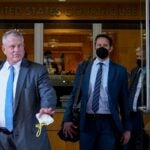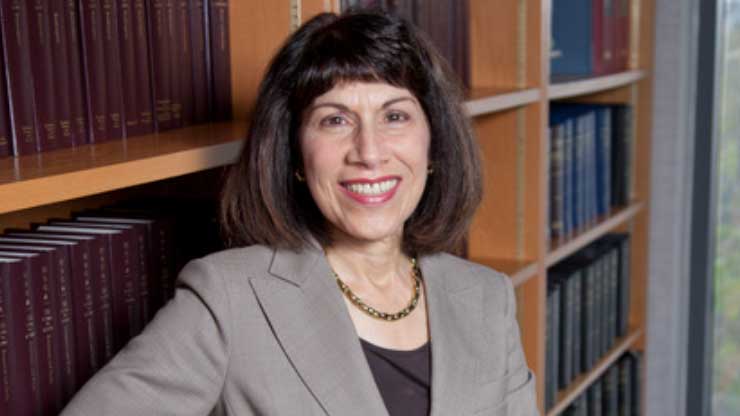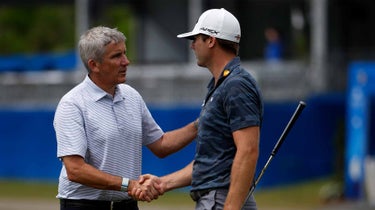Arccos recently released their annual Driving Distance Report — and most amateurs hit the ball much shorter than you might’ve thought. The post How far golfers actually hit their drives, according to data appeared first on Golf. Arccos recently released their annual Driving Distance Report — and most amateurs hit the ball much shorter than…
The winners and losers from LIV Golf’s first court battle, according to a legal expert


Elliot Peters, left, one of the lawyers on the PGA Tour’s legal team, exiting a U.S. courthouse in San Jose, Calif., on Tuesday.
getty images
In golf terms, the Tuesday court hearing — in which a federal judge denied a motion from three LIV golfers who were looking to participate in the FedEx Cup Playoffs — marked the start of what is sure to be a drawn-out competition.
And while it’s far too early to predict a winner, it’s not too soon to start keeping score.
We asked Craig Seebald, a partner and antitrust specialist with international law firm Vinson & Elkins, to help us tally up the shots from the first round of proceedings.
Call it a legal leaderboard.
Judge Beth Labson Freeman
Freeman was Tuesday’s “big star,” Seebald said. The players’ petition for a temporary restraining order, or TRO, was a request for emergency action, meaning that the judge was essentially put on the clock, tasked with moving quickly under pressure.
“She clearly read everything both sides submitted, digested it all and homed in on the key points for the antitrust case and the PGA Tour’s regulations,” Seebald said.

Judge Beth Labson Freeman
Law.com
Along the way, she asked probing questions of both counsels without betraying bias, and then arrived at a carefully reasoned, immediate ruling so that the players weren’t left in limbo.
“None of the parties involved could have rightly come away from this hearing feeling like they’d been treated unfairly,” Seebald said.
Seebald’s Score: “The judge eagled the first hole.”
The LIV golfers, aka The Plaintiffs
The LIV players had a tough day in court, Seebald said. To be granted a TRO, the plaintiffs needed to show that their Tour suspensions stood to cause them “irreparable harm.”
On this point, their attorneys argued that the players risked missing out not only on lucrative playoff purses but also on the prestige and other payoffs of participating in the majors.
Problem was, they were undercut by their own legal expert, who argued in a report presented to the court that LIV had paid these same players handsomely to compensate them for their losses.
The judge seized on this in her ruling. Rather than seeing evidence of irreparable harm, Seebald said, she concluded that the players actually had benefited by collecting for this loss through their fat LIV contracts.

Talor Gooch was among the plaintiffs in the Tuesday hearing.
getty images
“And she based this on the report of their own expert,” Seebald said. “Ouch.”
Making matters worse, Seebald said, even as the plaintiffs’ attorneys argued that the three golfers could not have waited until after the playoffs to join LIV because the window risked closing, word broke that Cam Smith had joined LIV and was planning to start playing on the rival circuit after the playoffs.
Was there really a race against the clock sign on? The news around Smith suggested otherwise.
As a final blow, the plaintiffs’ attorneys also likened the FedEx Cup Playoffs to the Super Bowl. Though this strained analogy had no effect on the judge’s TRO ruling, it did trigger a storm of golf-fan mockery on Twitter, which is never fun.
Seebald’s Score: “Double bogey for the LIV players.”
The PGA Tour, aka The Defense
The Tour achieved its main objective: avoiding a TRO. In that sense, it did well.
Its lead attorney also raised what Seebald said was a compelling argument around an area of antitrust law known as “refusal to deal,” which boils down to the notion that any business has a right to choose its business partners.
How does this relate to the case at hand? If LIV golfers were allowed to play in Tour events, the Tour would be put in the unfair position of providing a platform for its competition. That’s how the Tour’s attorney framed it, anyway, and the judge seemed sympathetic to the argument.
Though it wasn’t a deciding factor in yesterday’s TRO hearing, it is an issue that could rear its head again as the antitrust case plays out, Seebald said.
But not everything went smoothly for the Tour. Most notably, Seebald said, the judge raised skeptical questions about how the Tour is interpreting its own rules and suggested that LIV’s complaint that the Tour’s suspensions were being levied unfairly had some merit. This, too, is an issue that is bound to resurface.
Seebald’s Score: “The Tour is even par after the first hole.”





